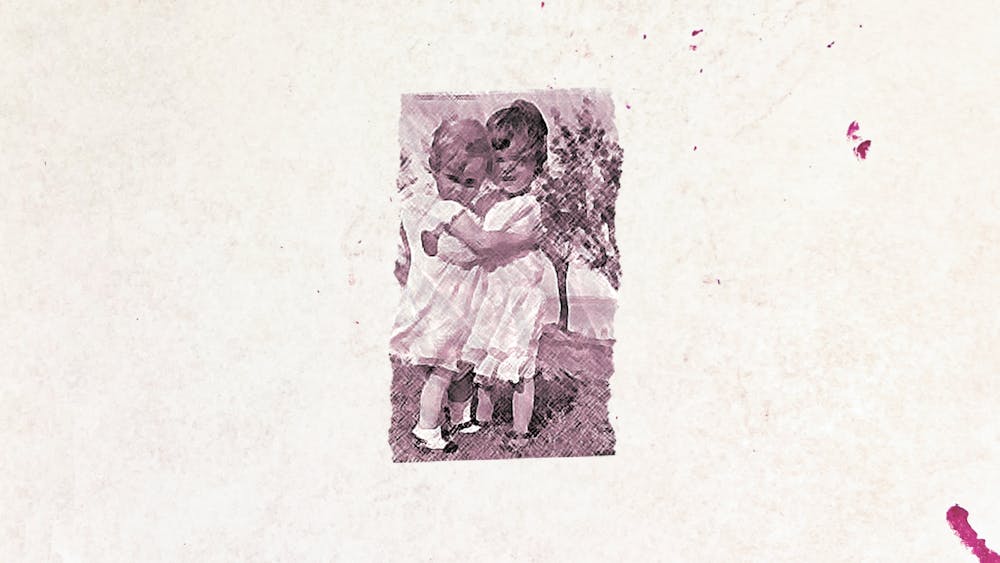This is how this story starts: I’m sick to my stomach. I wasn’t at the time, but I am now thinking about it. I wonder sometimes if I was in love with her. Let’s establish some characters. Me: naive, your typical middle school loser, unknowingly in the closet. Her: we’ll call her Mary. Funny, sweet. Graceful, too.
Here’s how the story really starts: I meet Mary in math class. She’s smart and she’s quiet and she tolerates me on our first hang–out which is, in truth, less a hang–out and more a project we’re assigned together. We’re at the town restaurant and I’ve accidentally thrown the $20 my mom gave me to pay for our pizza into the trash along with my plate. This leads to the immortalized moment, the one I remember in all its crystal clear big–screen glory. She’s holding the flap of the Coppola’s trash can open with the tips of her fingers, visibly repulsed and gagging, so I can stick my arm and half of my upper body down inside there and fish around for the bill. It takes a few moments. I’m red with embarrassment, but victorious. It’s a good tale for later.
Here’s how the story ends: we were best friends. Mary doesn’t believe in gay people.
I didn’t know I fell under that category when I met her. I don’t remember when I realized. But when I did, it crossed my mind to tell her a thousand times but never with genuine intent. I was more private back then.
There was a lot in the middle. I’d never laughed so hard with someone in my life. Teachers hated us. Her mom drove us to the beach. I forgot her birthday. She remembered mine. Code words, secret drawings, an indecipherable language. Years. Cliches. I loved her fiercely. I think she loved me too. There’s too much to put to paper.
Later, I had to go to a different high school. We had different experiences. I went to a diverse summer camp. Mary went to the local church. It wasn’t like I never could’ve seen it coming. It was a small town. But I never did. One day a mutual friend tore it open: "I think she’s homophobic." It didn’t break my heart at the time. I thought it would be okay. If it had been up to me, I wouldn’t have said anything. Who would I have been hurting, anyway?
But it got out, and you can’t put the cat back in the bag. Mary said: "I don’t think it’s worth arguing beliefs back and forth," and "I think it’s best to part ways." I was okay then, too, somehow. It was summer. I walked past the photos I had of us in my bedroom for months and didn’t feel a thing.
Something changed. I heard her name on the TV in November and I sat on the toilet and cried so hard I couldn’t breathe. I saw her in town walking with her mom and I had to turn around and go straight home. You were heartbreak the way a flower blooms, I wrote, too distraught to even cringe.
I didn’t care if she would hate or fear me. It didn’t matter. I used to think I would’ve kept it (my sexuality, her homophobia) a secret forever if it had meant a different outcome for us.
I don’t entertain daydreams about changing her mind any longer, but here’s an old one. Some future version of me says to her: "Will you be my maid of honor? By the way, I'm marrying a woman." That’s irrelevant. Everyone at this dream wedding is irrelevant. They’re all blurry faces except for me and her. Some future version of her says: "Duh." She gives a speech.
Sometimes I entertained a different kind of notion. There’s a possibility that she knew about me. Maybe she wanted the same thing—maybe she didn’t care, either. This one’s a little more out there. She would’ve cared.
I wonder sometimes, even now, when I’m sick to my stomach, if I’ve been in love without knowing it. But let’s look at the facts one last time, with the cold certainty of a heart sliced cleanly in half. We were best friends, past tense. The pen’s been set down, and even if I ever did love her in that way, it’s been lost to the years between us. If I did have a chance to pick the pen up again—if I bumped into her in my too–small town, me in my older and newer self, Mary in her white robe and blue veil—I wouldn’t.
The Mary in my head, the one that held the flap of the trash can open, the one that sat on the sand in the morning sun with me, the one that will speak at my wedding in some grand, alternate universe—I get to keep her, but that’s because I don’t get to keep all of her. If we had maintained the façade that our friendship inevitably would’ve decayed into, it wouldn’t have been honest. You can’t be friends with pieces of a person. She couldn’t have loved the part of me divorced from my sexuality, and I couldn’t have loved the part of her that was separate from her hatred.
It was never a matter of forgiveness because I don’t feel that she wronged me. But for whatever my—let’s call it what it is—higher moral standing, is worth, I would’ve forgiven her in a heartbeat. Mary, to you I say: I hope you remember me as I was. If I see you again I will tell you about myself. I owe that to both of us. I had fun writing together, and the story was worth it, every comma and apostrophe and period. This is your co–author, speaking: thanks. Signing off.







